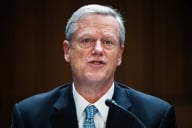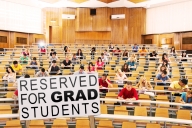You have /5 articles left.
Sign up for a free account or log in.
E-mail messages were flying among leaders of the Board of Visitors of the University of Virginia in the weeks leading up to the ouster of Teresa A. Sullivan as president of the university. The e-mail messages show that one reason board leaders wanted to move quickly was the belief that UVa needed to get involved in a serious way with online education.
The board leaders traded articles in which various pundits suggested that online education is the only real future for higher education -- and the e-mail messages suggest that board members believe this view. On May 31, for example, Helen Dragas, the rector (UVa-speak for board chair) sent the vice rector, Mark Kington, the URL for a Wall Street Journal column about online education. Dragas's subject line was "good piece in WSJ today -- why we can't afford to wait." The column, a look at the MOOC (massively online open course) movement in higher education, has the subhead: "The substitution of technology (which is cheap) for labor (which is expensive) can vastly increase access to an elite-caliber education."
The column argues that the MOOCs have the potential to change the cost structure in higher education, as long as institutions are willing to replace some in-person education with online education. "[I]n this way, college X might have its students take calculus, computer science and many other lecture courses online from MIT-Harvard (or other suppliers), and have them take other classes with their own local professors for subjects that are better taught in small seminars. College X can thus offer stellar lectures from the best professors in the world — and do locally what it does best, person to person," the column says.
The e-mail exchanges were obtained by Inside Higher Ed after The Cavalier Daily, the student newspaper at UVa, started tweeting snippets from them.
While the University of Virginia is home to numerous projects using technology for scholarship and teaching, the e-mail trail may not win over many of the faculty members and students who are furious at the board leaders for ousting Sullivan -- and doing so despite an outpouring of support for her. The university, compared to other research universities, has taken great pride in preserving closer student-faculty interactions. But the e-mail records suggest both Dragas and Kington are committed to a major push into online education.
Both took time to comment on a major donor's e-mail in which he suggested that university leaders study the way Stanford and Harvard Universities, among others, were having success online. The donor wondered in his e-mail if these developments are "a signal that the on-line [sic] learning world has now reached the top of the line universities and they need to have strategies or will be left behind." Dragas replied: "Your timing is impeccable -- the BOV is squarely focused on UVa's developing such a strategy and keenly aware of the rapidly accelerating pace of change."
Another article -- this one forwarded from Kington to Dragas -- was the "The Campus Tsunami," by the New York Times columnist David Brooks, predicting massive change from the MOOCs, and also predicting that the new model will involve much more learning from professors who are not at the college or university a student attends.
Various theories have been traded among UVa-watchers in the last 10 days about the source of conflict between Sullivan and the board, and the e-mail records suggest that online education may have been among them. In her statement on the day the board announced Sullivan's departure, Dragas used language similar to some of the columns that were being shared among board members, saying "We also believe that higher education is on the brink of a transformation now that online delivery has been legitimized by some of the elite institutions."
Sullivan is not quoted at length in the e-mail files that were released, but one from an alumnus/donor to Kington says that Sullivan provided a "pedestrian" answer to a question about how UVa was embracing the online education revolution. Sullivan is not responding to press inquiries at this time, but sources familiar with discussions she has had on distance education said that she viewed it as an important trend, but had expressed skepticism about the idea that it was a quick fix to solving financial problems, and that she viewed distance education as having the potential to cost a lot of money without delivering financial gains. Sources also said she viewed distance education as an issue on which faculty input was crucial.
Other e-mail records are interesting in other ways. Dragas and other board leaders have been widely criticized for being poor communicators during the last two weeks. But the e-mails show that board leaders obtained an estimate for 10 hours of "strategic communication consulting" at the cost of $7,500 (plus travel expenses). Dragas also sent fellow board members and the executive vice president of the university (but not Sullivan) a link to an article in Inside Higher Ed about Wesleyan University abandoning need-blind admissions.
Kington, one of the key players in the e-mail exchanges, is no longer vice rector. He submitted his resignation to Gov. Robert F. McDonnell on Tuesday, according to The Daily Progress. "In order to serve this university which I love and respect, and to help bring about new leadership on the Board of Visitors at this critical time, I am resigning my position as Vice Rector and as a board member effective immediately," he wrote.
On Monday, the university's Faculty Senate, after meeting with Helen E. Dragas, the board's rector, called for both Dragas and Kington to resign. Faculty members, who remain critical of the board and its process to select the university's interim president, cheered Kington's resignation. "We're halfway there on the first step to recovery," said Siva Vaidhyanathan, a professor of media studies who has been an outspoken critic of the board's actions over the past week. "For UVa to have a chance to recover, Kington needs to stay as far away from Charlottesville as possible."
Dragas has not made any statement about her future, and McDonnell declined to comment Tuesday about whether he would reappoint her to the board when her current term expires July 1.
Kevin Kiley contributed to this article.








